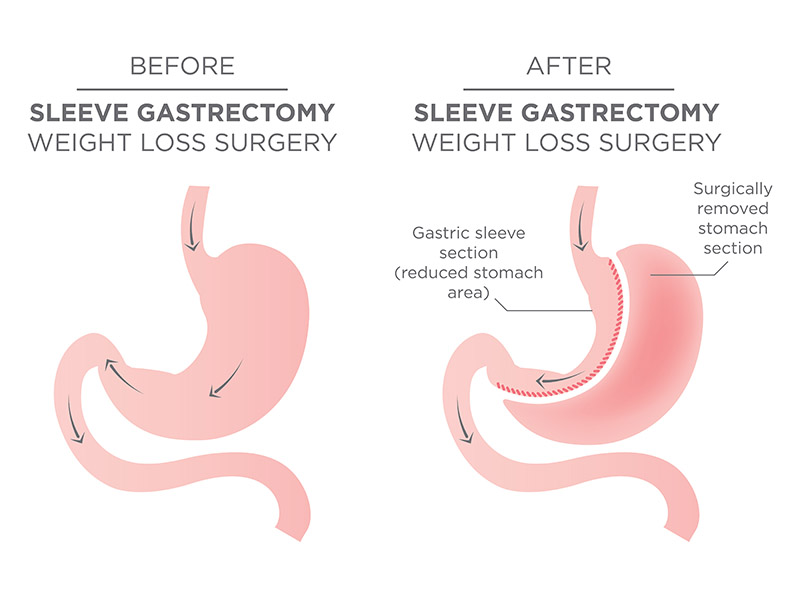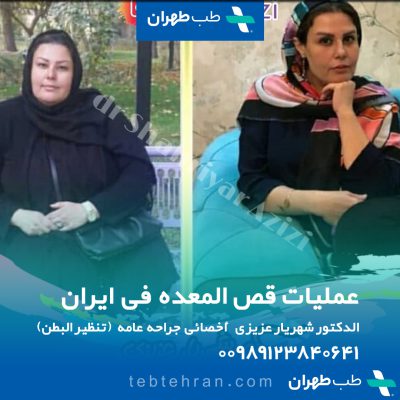sleeve gastrectomy in Iran
A sleeve gastrectomy in Iran is a surgical weight loss procedure in which the majority of the stomach is removed, resulting in a sleeve-shaped stomach.
It is a permanent procedure that restricts the amount of food that can be eaten and the speed that it passes from the stomach into the intestines. It is a purely restrictive procedure, unlike gastric bypass surgery which also involves some malabsorption.
The procedure involves removing around 80% of the stomach, including the area that produces the hunger hormone ghrelin. This results in the stomach taking the shape of a narrow sleeve or tube.
The reduced stomach size causes patients to feel full sooner while eating and stay full longer. The removal of part of the ghrelin-producing section of the stomach also results in suppression of appetite.
sleeve gastrectomy cost in Iran
| Type of bariatric surgery | Average price of surgery in Iran |
| sleeve gastrectomy cost | $3,000 |
| Gastric Bypass cost | $3,400 |
| Mini gastric bypass cost | $3,400 |
| Gastric band surgery cost | $3,400 |
Some key benefits of sleeve gastrectomy in Iran include:
• Significant, sustained weight loss – Patients can expect to lose 60-80% of their excess weight over 12-18 months.
• Resolution or improvement of obesity-related health problems like diabetes, high blood pressure, sleep apnea, etc.
• Elimination of hunger hormone ghrelin leading to reduced appetite and hunger.
• No rerouting or reconnection of the intestines. So lower risk of complications compared to gastric bypass.
• The remaining stomach functions normally so there are typically no issues with absorption of nutrients or specific food intolerances. Patients can eat most foods in moderation.
• Reversible procedure. The remaining stomach can still be reconnected to restore its full capacity if needed in the future.
As with any surgery, there are some risks including infection, blood clots, and bleeding. But overall, sleeve gastrectomy in Iran is considered a very safe bariatric procedure with good results for most patients. Lifestyle changes and follow up care are still required to achieve maximum benefits.
Diet in the first two weeks after sleeve gastrectomy in Iran
In the care program after sleeve gastrectomy, the following liquids should be consumed in small and frequent amounts:
- Water
- Tea
- Fruit juices
- Beef and chicken broth
- soup water
- stew water
- Rice glaze
Pay attention to the following points when using these items:
Drink filtered fluids while sitting
Eat the mentioned foods in the amount of one cup (50 cc) and at least 2 liters in 24 hours every quarter.
Be careful not to take more than the recommended amount at any time as it may cause stomach damage.
The list of prohibited substances in the diet for the first two weeks after gastric sleeve surgery
It is necessary to avoid eating the following in the first two weeks after sleeve gastrectomy in Iran:
- Milk
- carrot juice
- Sweet liquids
- Ice cream
- alcohol
- cigarettes
- hookah
- chewing gum
- Coffee and soft drinks
Note: Note that from the third week onwards, there is no obstacle to consuming milk, carrot juice and mixed foods except cereals.
If you feel nauseous and uncomfortable after drinking milk, be sure to drink lactose-free milk.
What is the amount of weight loss after gastric sleeve surgery?
Weight loss after gastric sleeve surgery is expected to be between 50 and 70%. But we have patients who have lost up to 80% (and more) of their total excess weight. Almost no other method (with or without surgery) can safely lose this much weight.
By looking at the table of weight loss after sleeve gastrectomy, you can see the weight loss process after this procedure. As can be seen from the table, the maximum amount of weight loss with sleeve surgery will be experienced in the first 6 months after the operation.
| Baz Zamani | Weight loss rate of sleeve operation |
|---|---|
| first month | 8 kg (approx.) |
| second month | 7 kg (approx.) |
| The third month | 5 kg (approx.) |
| the fourth month | 4 kg (approx.) |
| the fifth month | 3 kg (approx.) |
| the sixth month | 2 kg (approx.) |
| first year | 50 to 70% of total excess weight |
| second year | 80% or even more than 90% of excess weightWeight loss surgery in Iran |
Sleeve gastrectomy in Iran is a type of obesity surgery in which there is a significant reduction in gastric capacity and a forced and physiological restriction on the amount of food. In this type of surgery, 80% of the elastic portion of the stomach including a portion of the stomach that releases Ghrelin (the hormone that plays an important role in appetite aka the hunger hormone) is removed from the stomach and the remainder of the stomach is repaired with staples made of a specific titanium. 80% of the gastric tissue is removed.
Patients have little tendency to eat after surgery due to significant gastric emptying and physiological elimination of ghrelin, and even if they do not, they may not be able to eat too much. This restriction remains intact for the rest of their life, and surgery in the first year causes significant weight loss, and keeps the weight the same in the future.
In this procedure, which is one of the limiting methods, after laparoscopy, about 80% of the volume of the stomach is decreased with a machine that performs incision and stitching and is removed from the abdomen.
So by removing an area of the stomach that secretes hunger hormone (Ghrelin), the patient’s appetite will be normalized, and by eating a few tablespoons they will be full, and since the above-mentioned hormone works against insulin, after it being removed, a few days after surgery diabetes begins to be controlled.
Among the benefits of this technique we can mention that it’s a less surgical technique and the operation’s length is than combined procedures and in patients with end-stage diseases such as Crohn’s, Ulcerative Colitis or severe intra-abdominal adhesions due to surgeries done before, it is not possible to perform combined operations so it is the preferred method.
Occasionally, in patients with excessive abdominal fat or liver size being too large and heavy due to fatty liver disease, when entering the abdomen, the surgeon will not be able to perform the combined procedure because of insufficient bowel location and inadequate vision so the surgery will be performed in two stages.
The first stage is a sleeve gastrectomy and after 8 months to a year and weight loss and improvement of the intra-abdominal anatomy, the second stage is turning sleeve gastrectomy to one of the combined methods. However, in many cases the patient responds well to the first stage and does not require a second stage.
Who Will Benefit From sleeve gastrectomy in Iran?
The surgical technique is chosen by the medical team based on preoperative consultation, examinations and lifestyle reviews before surgery, but generally in people who are severe and unavoidable snack eaters and overweight and people with specific, long-lasting metabolic diseases like diabetes, sleeve gastrectomy is not the first surgical option.
Disadvantages of Sleeve Gastrectomy:
for the snack eaters it may not initially be the ideal answer. For example, if a person is over 50 kg overweight and is more of a snacks and sweets person and undergo sleeve gastrectomy, they may lose 20 to 25 kg (about 40 to 50 percent) and stop losing weight very quickly. In these cases, it is advisable to have combined procedures.
if the surgery is not done on the right person it is associated with a high rate of obesity (after one to two years) which in some statistics reaches up to 50% (one out of two persons). Therefore, the surgeon should be careful in choosing the procedure method.
This method is not recommended for people with gastroesophageal reflux disease (GERD) because it may worsen and may cause esophageal ulcers and other long-term problems. Therefore, this procedure requires maximum precision endoscopy prior to the patient’s surgery to use other appropriate procedures to improve the complication if moderate to severe endoscopic symptoms (esophagitis) are present.
Since this procedure removes part of the stomach and extracts it from the body, the sleeve gastrectomy is irreversible.
Since sleeve gastrectomy do not work on the intestines, and a number of hormones similar to starvation that are anti-insulin secreted from the small intestine it has less effect on the treatment of diabetes than combined surgeries.
Weight Loss in sleeve gastrectomy in Iran
It is expected that by performing a sleeve gastrectomy, a person loses between 70 and 90 percent of his or her overweight in 18 months or an average of up to 45 kg in 18 months.
Side Effects
Some of the complications of sleeve gastrectomy are like many other surgeries, such as wound infection, suture tenderness, etc., which can occur in any other operation and is not necessarily related to the gastrointestinal tract or obesity. However, these cases are less likely due to the laparoscopic technique and the small incision site and the severity of the complication is milder if present.
Other complications such as embolism, bleeding and leakage from the site of surgery are partially preventable and are not just for sleeve gastrectomy in Iran and largely depend on preoperative counseling and the patient’s own condition and mobility.
Among other factors that influence the incidence of bleeding and post-surgery leakage
1. The type of the staples and their brand
2- Standard surgical technique by experienced surgeon with academic education (Specialty Laparoscopic and Obesity Fellowship)
Although these surgeries may be performed by non-specialists, careful attention to details and ability to control the operation are out of the reach of these physicians and may increase the error rate and risks, complications and even risk of death.
3. Tissue restoration of the patient’s body: by comprehensive preoperative examinations to achieve the ideal preoperative level.
Sleeve gastrectomy and cancer prevention
Contrary to the belief of some people about the association between sleeve gastrectomy and cancer, it should be acknowledged that this theory is completely false and that sleeve gastrectomy does not cause or develop gastric cancer unless one has a gastric cancer or predisposing factor prior to sleeve gastrectomy that remains undiagnosed after surgery and continues to grow. In addition, because of its significant weight loss, sleeve gastrectomy also prevents many cancers, including ovarian cancer.
Stomach enlargement after sleeve gastrectomy in Iran
After sleeve gastrectomy if you do not follow the nutritional guidelines, there is a possibility of a 10 to 15 percent increase in gastric volume over time, which is a slight change, given the 80 percent reduction in intraoperative volume.
Complications of sleeve gastrectomy in Iran
Some potential complications of sleeve gastrectomy in Iran include:
• Leaks from the staple lines – The gastric sleeve involves stapling and dividing the stomach. There is a small risk of leaks from the staple lines which can lead to infections and other problems. This usually occurs in the first few days after surgery.
• Strictures – The staple lines can heal with scarring that narrows the sleeve opening. This is known as a stricture and can cause nausea, vomiting, and inability to tolerate solid foods. Strictures often require endoscopic dilation to stretch and widen the opening.
• Gastroesophageal reflux disease (GERD) – The sleeve may not prevent reflux of stomach acid into the esophagus. GERD symptoms such as heartburn and regurgitation can occur or worsen after a sleeve gastrectomy. Medications or further surgery may be needed to treat GERD.
• Vomiting and nausea – Some amount of nausea and even vomiting after eating is common in the first few months after a sleeve. In most cases, this resolves over time as the stomach adjusts. Rarely, severe, persistent nausea and vomiting can occur due to a narrowing or twist in the sleeve.
• Gallstones – Rapid weight loss after the sleeve can increase the risk of gallstones. Ultrasound monitoring and gallbladder removal (cholecystectomy) may sometimes be recommended.
• Hernias – The incision sites can be weak spots for hernias to develop. Umbilical and ventral hernias may require surgical repair.
• Nutritional deficiencies – The smaller stomach may not absorb enough of certain nutrients like protein, iron, calcium, and vitamins. Nutritional supplements and monitoring your nutritional levels are vital after a sleeve gastrectomy.
• Weight regain – Although the sleeve can achieve significant weight loss, weight regain is possible over time without continued lifestyle changes. Weight maintenance still requires changes to diet and exercise habits.
Those are some of the more common and significant complications that can occur after a gastric sleeve surgery. Close follow up with your bariatric surgeon is needed to minimize risks and address any complications.
sleeve gastrectomy in Iran – بهترین جراح اسلیو معده








